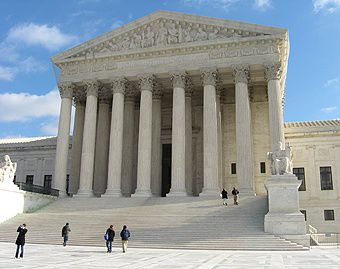The Supreme Court’s decision not to review defense of marriage appeals by five states has been met with disappointment, along with a renewed emphasis on highlighting the meaning and purpose of marriage. Two leading U.S. bishops on marriage issues referred to the decision as “extremely disappointing and surprising.” “Marriage is and can only be between a man and a woman — a unique relationship in which the state has a vested interest. It is the only institution that unites a wife and a husband together for life and unites them to any children that come from their union,” said Bishop Richard J. Malone of Buffalo and Archbishop Salvatore J. Cordileone of San Francisco. “This truth presumes and supports the equal dignity of all people, especially of children whose right to a mother and a father deserves the utmost legal protection,” they continued in an Oct. 6 statement. “The Supreme Court’s action fails to resolve immediately the injustice of marriage redefinition, and therefore should be of grave concern to our entire nation.” Bishop Malone is the chairman of the U.S. bishops’ Committee on Laity, Marriage, Family Life and Youth, and Archbishop Cordileone heads the Subcommittee for the Promotion and Defense of Marriage. The bishops responded to an Oct. 6 announcement by the Supreme Court that it would not accept appeals in cases from Indiana, Oklahoma, Utah, Virginia and Wisconsin, in which the states had appealed to protect their right to define marriage in law as an institution between a man and a woman. In these states, lower courts ruled that such laws were unconstitutional. Bishop Malone and Archbishop Cordileone noted that “(a)ll of these state laws were democratically enacted, including most by the direct vote of large majorities within just the last decade.” “Millions of Americans had looked to the Court with hope that these unjust judicial decisions might be reversed. Instead, as a result of the Supreme Court’s action today, those decisions are allowed to take effect. Furthermore, marriage laws in six other states are now in jeopardy,” they said. By declining to hear the cases, the Supreme Court ends those states’ ability to delay the redefinition of marriage to include same-sex couples. This will allow the lower courts’ decisions redefining marriage to go into effect, bringing the total number of states to recognize “gay marriage” up to at least 30, plus the District of Columbia. “The court’s decision not to take up this issue now means that the marriage battle will continue,” explained Byron Babione, senior counsel for Alliance Defending Freedom, in an Oct. 6 statement. “Several federal courts — including those in the 5th, 6th, 8th, and 11th circuits — still have cases working their way to the Supreme Court.” “The people should decide this issue, not the courts,” he underscored. Brian Brown, president of the National Organization for Marriage, expressed his surprise and disappointment in the court’s decision not to review the cases. “Marriage is the union of one man and one woman; it has been this throughout the history of civilization and will remain this no matter what unelected judges say,” Brown said in an Oct. 6 statement. He said that he found it “mind-boggling that lower court judges would be allowed to impose the redefinition of marriage in these states,” without the higher court stepping in. Brown said that he was not discouraged, despite the ruling, adding that he was “determined as never before to fight for the institution that God created and humankind has proven is the best arrangement for the well-being of men and women, for children, and for society as a whole.” Marriage author scholar Ryan Anderson said in an Oct. 6 post for the Daily Signal that the decision to reject the cases “is an unfortunate setback for sound Constitutional self-government and a setback for a healthy marriage culture.” Anderson clarified that the court’s decision “does not speak one way or the other to the merits of the cases,” though it does leave the lower courts’ rulings against the traditional definition of marriage intact. “The Supreme Court should have reviewed these cases and should have upheld the authority of citizens and their elected representatives to make good marriage policy,” he said. “Instead, the Supreme Court left standing bad rulings from lower federal courts that usurped authority from the people by striking down good laws.” Noting the “decisive importance” of marriage in serving the common good and fighting poverty Bishop Malone and Archbishop Cordileone stressed that “marriage needs to be strengthened, not redefined.” “Our young people need encouragement to embrace the gift and responsibility of marriage as it truly is — a permanent, faithful, and fruitful gift of self between a man and a woman,” the bishops said. “May all of us continue to work to strengthen and protect marriage and stand for justice for all, especially children, who are the most vulnerable.”

